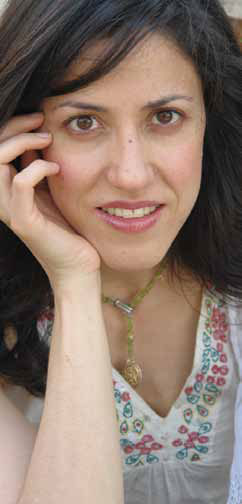Campus News
Uncommon People / Azadeh Moaveni: The seeds of a writer were sown at UCSC
At UCSC, I learned what a potent tool writing could be in narrating, and thus owning, my experience in America.

This rather stern view rested on the belief, not altogether mistaken, that society needed us to contribute much more than our thoughts on paper, and that in the process of learning and practicing a craft, we would be accumulating the insight and experience that would enrich our writing.
I chafed at that cultural logic at the time, but it turned out to be not so particularly or tediously Iranian as I thought. The literature I encountered for the first time at UCSC, in the core course of Oakes College, reflected a similarly demanding and activist view of the writer’s place in the world. It was first at Oakes, and later in other classes, that I recognized and began to understand all the inchoate feelings that had underpinned my growing up Iranian in America. The fashionable shorthand for this process was “consciousness raising” and its effect on me was profound and electric.
I suddenly had an intellectual language to consider all that had befallen my family and my country; I was able to articulate in a terse, 200-word paragraph why I grew up despising Sally Field (she had starred in the crudely anti-Iranian film Not Without My Daughter). My core course instructor, Dave Dodson, was the mentor whose approach helped ground me as I took this new awareness out into the disciplines that had always attracted me. In his classroom I learned what a potent tool writing could be in narrating, and thus owning, my experience in America. I also learned to value humility, and in the process, how to avoid the navel-gazing and self-righteousness that would get in the way of people wanting to hear my story.
If at Oakes I was inspired with the political power of a tale, then it was at City on a Hill Press, under the tutelage of writing instructor Conn “Ringo” Hallinan, my adviser at the paper, where I learned how to craft a story. By the time I arrived at the newspaper, I had already endured the kind of rigorous editing in literature classes that had beaten out all the highschool laziness in my writing. I learned in those literature classes the painstaking, sentence-by-sentence crafting of a polished piece of a work. It was under Ringo that I learned to love the genre that would become my life’s work: literary journalism. A news story, Ringo taught us, is a formula anyone can learn. It’s the long form journalism that is intellectually vibrant, that makes a contribution to history, that elevates reporters to writers. This belief inspired me to become a journalist and to write books “on the side,” a career that has managed to fulfill both me and that pesky Iranian dictum.
Azadeh Moaveni (Oakes ’98 ) is author of Lipstick Jihad and Honeymoon in Tehran and co-author, with Shirin Ebadi, of Iran Awakening. She has reported from throughout the Middle East for Time, the New York Times Book Review, the Washington Post, and the Los Angeles Times. She is currently a Time magazine contributing writer on Iran and the Middle East and lives in Cambridge.